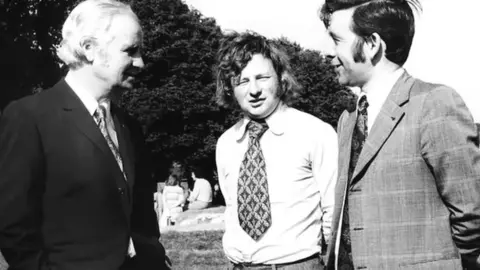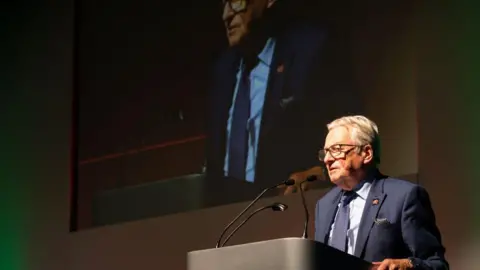Political correspondent, BBC Wales News
Political reporter, BBC Wales News
 BBC
BBCFormer Plaid Cymru leader Lord Elis-Thomas, who has died aged 78, went from a maverick to a member of the political establishment.
During a career that involved 12 years as the Welsh assembly’s first Presiding Officer, the equivalent of the Speaker of the House of Commons, he was never far from controversy and criticism.
Occasionally the criticism came from his own party, particularly when he accepted a peerage and attacked Welsh language nationalism.
Some might not have liked the way he held forth on controversial topics while holding an office that demanded neutrality.
But he saw it as his job to stand up for a fledgling legislature – a job that sometimes needed an outspoken figure.
Dafydd Elis-Thomas was born in Carmarthen in 1946, and educated at Llanrwst Grammar School and Bangor University.
He led Plaid Cymru’s youth section and campaigned against the 1969 investiture of Prince Charles in Caernarfon castle.

‘Baby of the House’
In 1974 he was one of three Welsh nationalists elected to the House of Commons with Gwynfor Evans and Dafydd Wigley.
At 27, he was the youngest member of that parliament – the “baby of the house”.
The other Dafydd beat him in a contest to lead Plaid when Mr Evans, a giant in the party, stood down in 1981.
The battle for the succession was a battle to decide whether Plaid tacked to the left under Dafydd El or held a more moderate course under Dafydd Wigley.
Following Mr Wigley’s resignation, he was elected party president in October 1984, beating Dafydd Iwan, the candidate from the party’s traditionalist wing.
Under Lord Elis-Thomas’s leadership, Plaid gave strong support to the miners in their strike of 1984 and won a third seat in parliament at the 1987 election.
He stood down as an MP in 1992 and was ennobled as a cross-bench peer in the same year, despite his party’s opposition to the Lords at the time.
He served as chairman of the Welsh language board from 1994-99 before his election as Plaid Cymru Assembly member for Meirionydd Nant Conwy.
He served as presiding officer of the Welsh Assembly, now called the Senedd, from 1999 to 2011, but the role did not stop him making headlines with his outspoken views.
He clashed bitterly with the then first secretary Alun Michael in 2000 over procedures surrounding a no-confidence vote in Mr Michael’s handling of European funding.
 Getty Images
Getty ImagesHe was an early advocate for a separation between the assembly and its executive – a divide that was finally enacted in the Government of Wales Act 2006.
He ignited furious debate in 2001 when he said there was an anti-English feeling within Welsh language nationalism and there was no such thing as a Welsh-speaking heartland.
He was known for a memorable turn of phrase, such as this take on a row about where assembly members sit in the chamber: “What is the point of getting up in the morning, cleaning my teeth, washing and shaving if you go to work in an institution like this.”
He pushed for a more powerful assembly, calling for the devolution of control over policing and broadcasting.
He intervened in a spat between Westminster and Cardiff Bay about devolving powers over housing policy, accusing some Welsh MPs of “acting contrary to the spirit of devolution”.
 Plaid Cymru
Plaid CymruNot everyone appreciated his style. Despite having neighbouring offices during the second assembly, he and former deputy presiding officer John Marek barely spoke after rowing about a departing official.
He called for assembly members to boycott a meeting with the Israeli ambassador, organised by the assembly’s only Muslim AM,.
In 2011 he provoked a furious reaction from Labour and the Conservatives when he said the Wales Office should be scrapped in the wake of the referendum to give the assembly direct law-making powers.
Soon after, he let it be known he would enter the contest to succeed outgoing Plaid leader Ieuan Wyn Jones.
Twenty years after he vacated the role of party president, it was a typically provocative move from one of Welsh politics’ most colourful characters.
 Getty Images
Getty ImagesThat contest was won by Leanne Wood, who Elis-Thomas went on to clash with over the direction of Plaid Cymru.
In 2016 he quit the party to sit as an independent member in Cardiff Bay.
He said it was because Plaid Cymru was not “serious” about taking part in the Labour-led Welsh government.
Later he was appointed deputy minister for tourism, sport and culture in that government, led by Carwyn Jones. He left the Senedd in 2021.
Lord Elis-Thomas leaves a widow, Mair Parry Jones, and three sons from a previous marriage.

